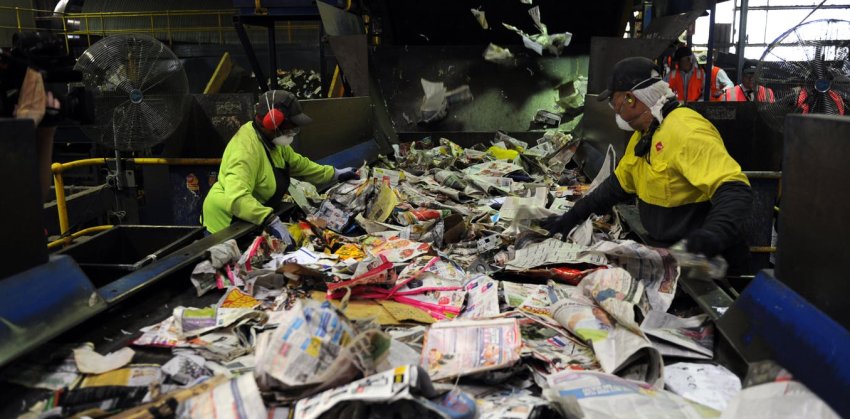
A meeting of state and federal government representatives on April 27 has set the goal of making all Australian packaging reusable, compostable or recyclable by 2025.
This was their response to the recycling crisis that has emerged since China announced they will no long take Australian waste. It sounds good. But it is pathetic!
The 2025 date is the only target that has been mentioned but it is vague. It is not backed by funding commitments. It merely restates old aspirations and does not challenge current corporate plans for the sector. But most importantly, even if achieved, it will not solve the waste problem.
Just because something is recyclable or reusable does not mean that it will be recycled or reused.
Capitalist recycling processes are market based. There is a recycling crisis because the international “market price” for recyclable waste has collapsed.
Individual households may see recycling as a civic duty or a contribution to society. But governments and corporations see it as a market, a commodity, a profit-making opportunity.
No essential service should be held hostage to the vagaries and fluctuations of the capitalist market. It is a massive indictment on the “free enterprise system” that such a crisis could develop simply by the decision by one country to change its policy. Why was recycling going to China? Why was it not it being dealt with here?
Even at its best, “recycling” is over-rated as a waste-management strategy.
The fact that it seemed logical to ship waste to China with all its attendant financial and environmental costs illustrates that the current waste management system is all about pushing the problem out of sight rather than actually solving it.
As Socialist Alliance councillor Sam Wainwright wrote recently: “Any production that generates by-products that cannot be absorbed into making some other socially useful good or service or be sustainably reabsorbed by nature, is by definition a failed technique that needs to be phased out”.
Current recycling techniques are energy intensive and polluting. They are far from a model of genuine sustainability.
However the push to urge individual consumers to “recycle” is very useful for the corporate elite. Waste is always presented to the public as a product of consumption, not a product of production.
The only genuinely sustainable solution to the waste problem is to not produce “waste”. This can only be achieved at the production stage, not the consumption or post-consumptions stages and it needs to be backed up by mandated restrictions on corporate producers.
One of the most urgent measures needed is a simple ban on the production of single use plastic — not just plastic shopping bags. Corporations should be made to: minimise packaging; design products for reuse and repair; and eliminate planned obsolescence.
Corporations should also be mandated to track and take responsibility for all of the waste products of production (including packaging) to ensure it is either recycled or sustainably returned to the environment from which it came. This — not heroic efforts by consumers to minimise waste — is the genuine path to a zero waste economy.
Instead, government spokespeople are increasingly talking about “waste to energy” incinerators as a means to combat waste. Incinerators are major polluters in their own right. They are not a sustainable solution to the waste problem and they are inferior to solar, wind and other renewable energy processes for energy production.
In their essence, they are another means to allow corporate polluters to continue going about their business of pollution and environmental destruction. The scale of the problem is revealed when you consider that a World Resources Institute study found that “between one half and three quarters of the resource inputs used by industrial economies are returned to the environment as waste, within twelve months” in industrialised countries.
It might seem simpler to just encourage people to recycle. But there is no way to actually deal with the problem of waste other than to tackle the corporate power that is responsible for its continued production.
[Alex Bainbridge is a national co-convener of the Socialist Alliance.]